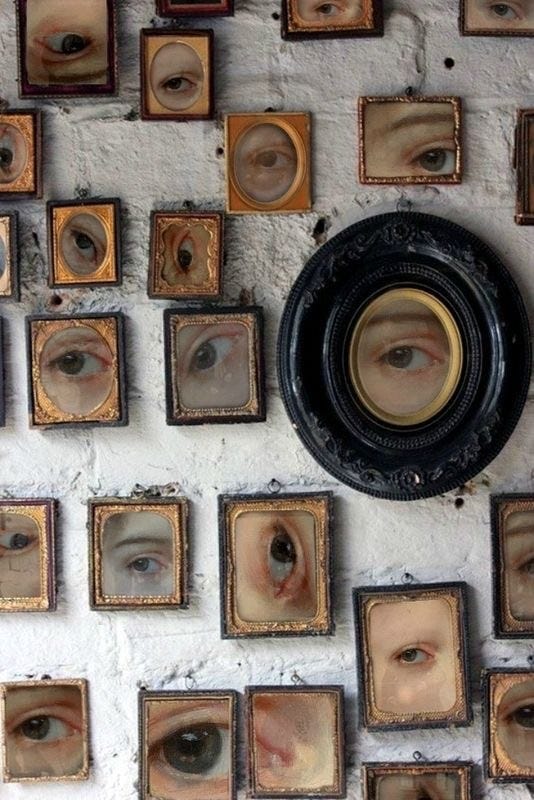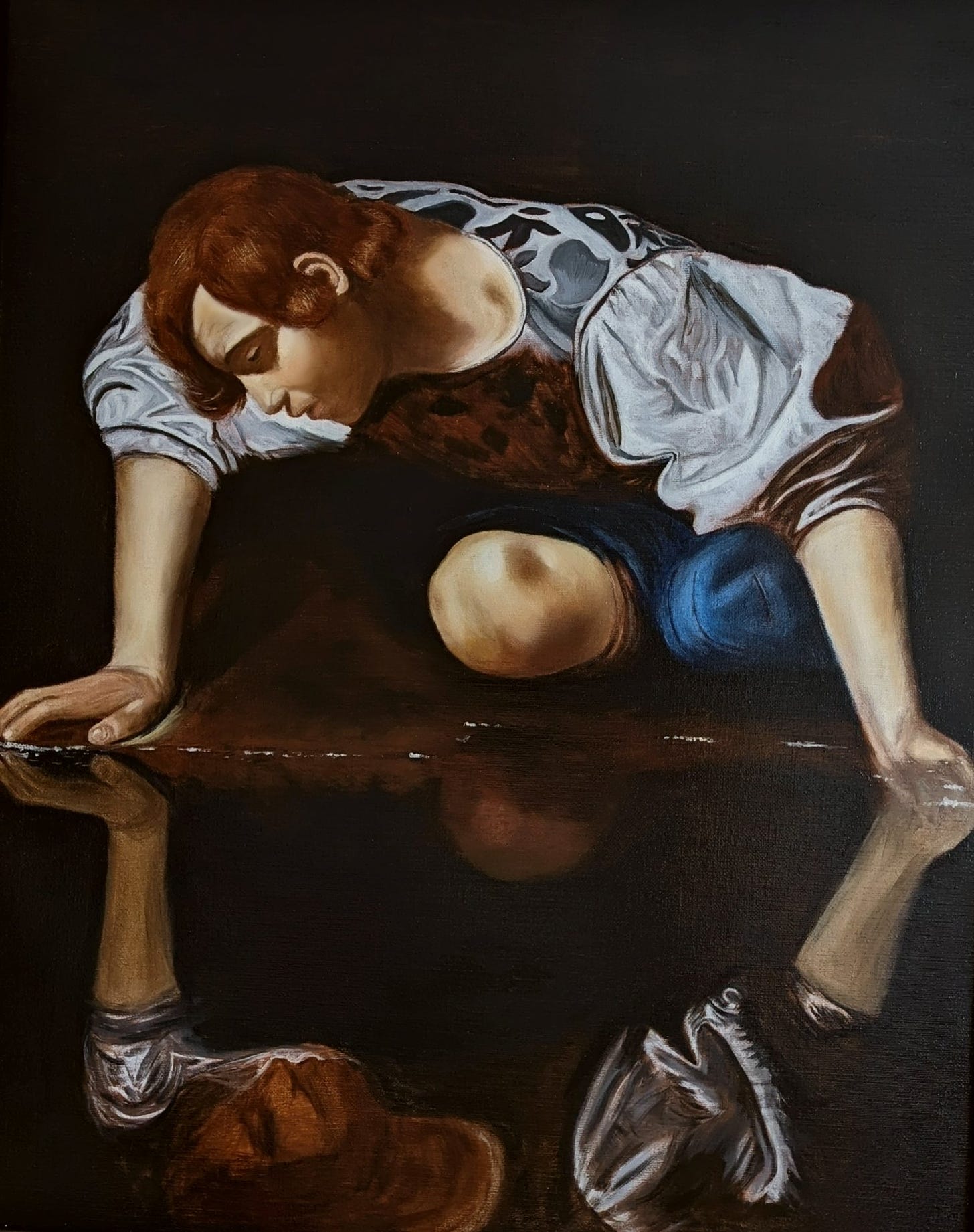Welcome to Ruminations, a newsletter dedicated to sharing vulnerable musings on art, literature, and creative identity for writers & ruminators alike. Subscribe for monthly letters, or join our coven of overthinkers to unlock the FULL archive of poetry, audio & visual content, exclusive musings, and community conversations. Your contribution helps keep Ruminations running & this writer at her desk ❧
There comes a point where we must face ourselves.
Stare down the barrel of a gun reflected in a bulletproof mirror. Meet our own eye.
It’s hard to avoid your reflection these days. Over time, I’ve grown more accustomed to mine — the pointed bow of my lips, the sweep of my hairline, the fine fuzz of my brows — but only to an extent. I struggle to accept my patchwork skin, all scabs and scars, from years spent nose to reflected nose. My fingers, well-trained in self-destruction, work tirelessly to turn mounds into craters. And my eyes, accessory to this lifelong crime, though quick to identify new blemishes and imperfections, struggle to hold their own gaze.
I’ve picked my skin all my life — from scabs to hangnails to pimples — and I have vowed almost every other week to stop picking for good. It’s a habit that worsened during my teenage years; adolescence was dutifully unkind, plaguing my nose and forehead with a vengeance. Each new pimple felt like a betrayal; another reason to compare myself to my peers and reduce myself to lesser. For a time, I became convinced that picking the pimples away was the trick to speeding up the healing process. By some fault in my teenage logic, I believed that squeezing a zit before it reared its ugly head would circumvent the inevitable slow eruption by jumping the gun and creating the wound myself. Never mind the blood. Never mind the hideous scabs that were twice more noticeable and tempting to deface.
As I dug my nails in, I was in control of my fate. I was in control of my pain and image. I was a girl who did something when faced with an issue.
I often spend half an hour in front of the mirror in the blink of an eye. I would hate to know how much time I’ve cumulatively spent picking apart my reflection — I have no doubt it would terrify me. After a ruthless session in front of the mirror the other week, I took to TikTok to search for tips and tricks to help me heal. Some advice I’ve adopted: Colourful pimple patches. Candles in the bathroom instead of overhead lights. Long-sleeved clothing. Applying makeup so that you’re less likely to want to ruin it. And, a more recent suggestion from someone I know, fidget toys. I’d love to be able to say that at the time of writing this, my skin is clear and sabotage-free, but that would be a lie. I’m not quite there yet.
I’m attempting to reform several other areas of my life too. Break other bad habits. If you’re a regular reader, it will come as no surprise that my writing practice is one of those areas. I’ve always found comfort in poetry — its obscurity, its ambiguity. But more recently, I have dipped my toe into essays and fiction, and I’ve discovered that the veil I hide behind when writing a poem only serves me so well in other written forms. I’m wonderful at writing around a point. Better at isolated specificity. Well-versed in deception. As soon as I step back from the page, my disembodied mirror, and view the piece as a whole, I struggle to know where to look. Instead, I pick out the flaws and coax the rough edges into something smoother. If I squint, everything appears cohesive.
But I can never look the story in the eye.
Much like when faced with my humanity in the mirror, I shy away from the soul of the stories I draft on the page. It scares me to look myself, and my stories, in the eye. It unsettles me to hold my gaze. This is an intimacy I’ve distracted myself from for as long as I can remember. One also wonders, were humans ever meant to look themselves in the eye? Or is it a privilege meant only for others? On one hand, I’m faced with pathological self-avoidance, and on the other, an insatiable curiosity for depth and self-awareness. I can’t help feeling that this sword is double-edged, this gun, double-barrelled. To what extent should one be willing to “Know thyself” — are we to know our limits or our souls?
When I stare down the barrel of a loaded gun and meet the eye reflected back at me, am I Narcissus at the water’s edge, rooted to his likeness, or am I brave?
“The role of the artist is exactly the same as the role of the lover. If I love you, I have to make you conscious of the things you don’t see.”
― James Baldwin
We artists have been tasked with the beautifully wretched role of mirroring the world back at itself. We must dare to bear witness and join the enduring procession of writers in this ageless act of creative translation. I hope we both find the courage to rise to the challenge, to sit with discomfort, and find solace in it all.
Yours in rumination,
Caitlin ❧
P.S. Whether you, too, pick your skin or have some other habit you’re trying to kick, I hope that in writing this piece, if anything, you feel seen and understood. My inbox is always open x








I felt this - been thinking a lot about being perceived lately. It’s strange how much more exposed I feel writing nonfiction and fiction, like there’s nothing to hide behind. Poetry is both more revealing and concealing, it feels safe. Thanks for sharing Caitlin 🩵
There’s so much I love about this. Let’s go through some lines:
Literally every bit of the first paragraph but namely:
“My fingers, well-trained in self-destruction, work tirelessly to turn mounds into craters.”
- When I read this, I knew the rest of the piece would be a work of art. It’s so cool to see minds think this way. That is some raw, heartfelt creativity.
“I often spend half an hour in front of the mirror in the blink of an eye. I would hate to know how much time I’ve cumulatively spent picking apart my reflection — I have no doubt it would terrify me.”
- I love the introspection this offers. You never really take a step back and think about it this way, and you pointing this out allowed me to do that. So cool.
“I’m wonderful at writing around a point. Better at isolated specificity. Well-versed in deception. As soon as I step back from the page, my disembodied mirror, and view the piece as a whole, I struggle to know where to look. Instead, I pick out the flaws and coax the rough edges into something smoother. If I squint, everything appears cohesive. But I can never look the story in the eye.”
- To be honest, I prefer this type of writing. Everyone knows what a bush is. But if we beat around the bushes, it forces the reader to think and go on an adventure to make out what it is that we’re trying to hit. Many of the most compelling essays I’ve read takes this style of writing and I would say you are masterful at it.
“This is an intimacy I’ve distracted myself from for as long as I can remember. One also wonders, were humans ever meant to look themselves in the eye? Or is it a privilege meant only for others? On one hand, I’m faced with pathological self-avoidance, and on the other, an insatiable curiosity for depth and self-awareness. I can’t help feeling that this sword is double-edged, this gun, double-barrelled. To what extent should one be willing to “Know thyself” — are we to know our limits or our souls?”
This sealed it. I’m recommending this to my mentor at Duke and Chapel Hill. He’ll love this.
Really loved this!